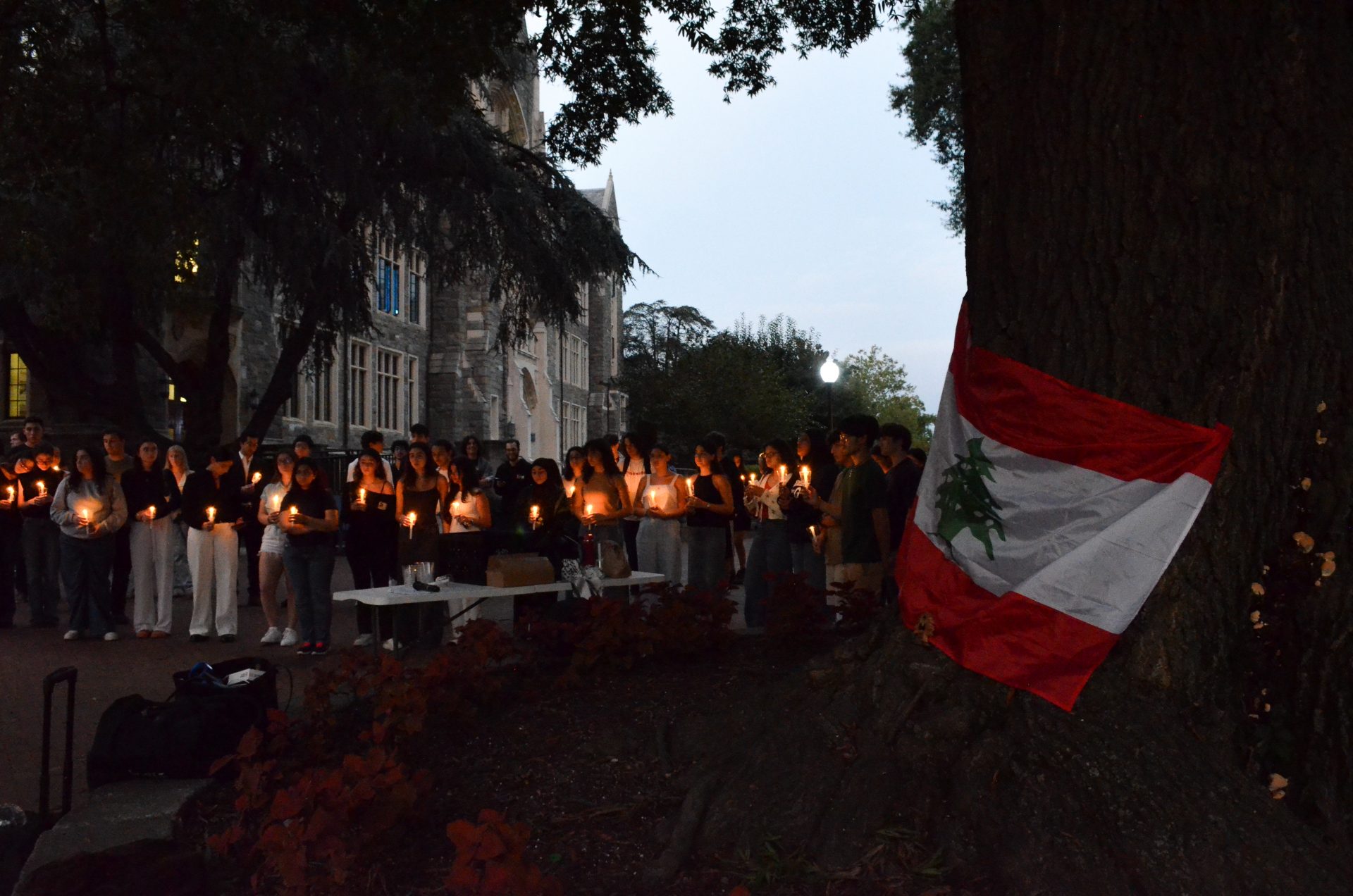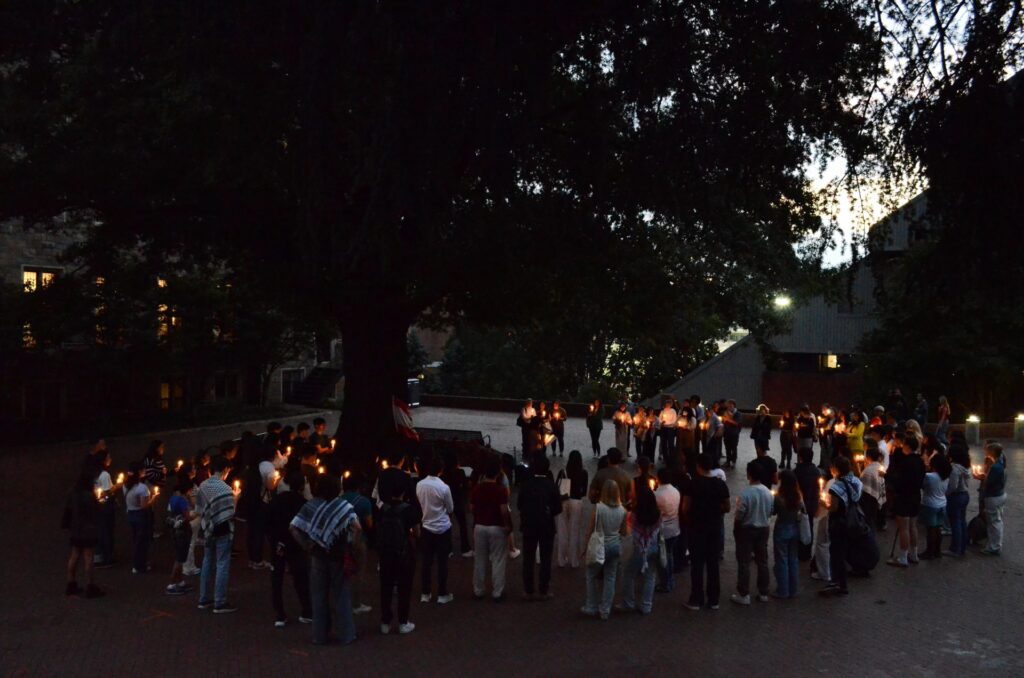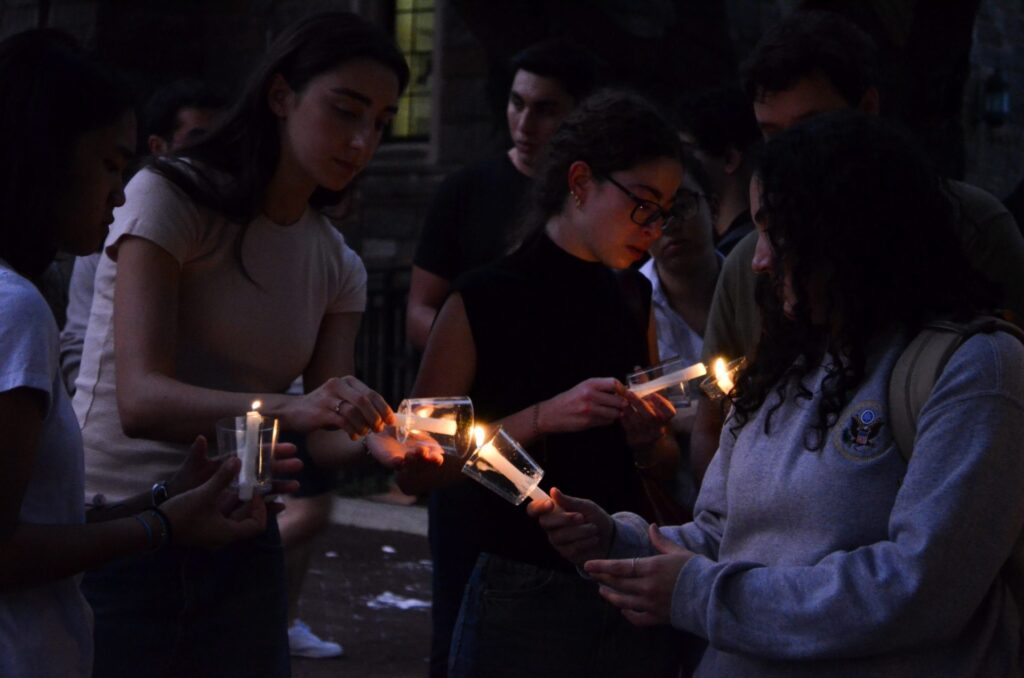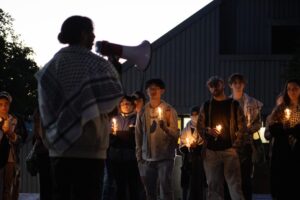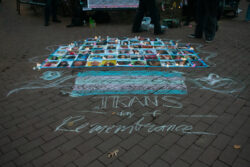Yara Moawad’s (SFS ’27) 13-year-old brother called her recently, thinking a bomb had fallen into their family’s garden. Moawad is from Beirut, and she said the sounds of Israeli bombings in and around the city have been traumatizing for her family, particularly her little brother. Their whole house shakes, and it’s hard to tell how close the airstrike hit.
Since that call, Moawad’s family has relocated to their house in the mountains for safety, but she’s still afraid for her friends, in particular two who are pre-med students at the American University of Beirut.
“They don’t have school, they were telling me yesterday: ‘Yara, please study, we’re never going to complain about studying again,’” Moawad told the Voice. “It just broke my heart and I have to listen to them. And they are, from midnight to 5 a.m. in Lebanon, not able to sleep from the sound of bombs.”
Moawad is one of over 100 students, faculty, and community members who attended a candlelit vigil held by the Lebanese Students Association on Oct. 4 to mourn the over 1,400 people, among them civilians, killed by Israeli attacks on Lebanon.
Since Oct. 7, 2023, Israel and Hezbollah, a paramilitary group based in Lebanon, have traded rocket fire back and forth across their shared border, displacing hundreds of thousands of people in both countries. Over the last two weeks, Israel has escalated these exchanges with a series of attacks against Hezbollah, including bombings in and very near Beirut. On Oct. 1, Israel launched a ground invasion into Southern Lebanon which it says targets Hezbollah, but has resulted in the displacement of over 1.2 million Lebanese people from their homes.
The vigil for Lebanon in Red Square began with both a Muslim and Christian prayer to honor the dead and injured. It included readings of poetry from the famous Lebanese poet Gibran Khalil Gibran as well as a chance for students and community members to share their thoughts and feelings.
As speakers reflected on the beauty of Lebanon and the resilience of the Lebanese people, students held each other and many were visibly crying, their faces illuminated by candlelight.
Romy Abu-Fadel (SFS ’26), a member of the Lebanese Students Association, was the first speaker and began by reflecting on Lebanon’s long history of conflict and perseverance.
“Our people are more than numbers. So, I could tell you about our people.That we have suffered for generations. Under famine. Under civil war. Under invasions and occupations. Through the port blast. Through economic crisis,” Abu-Fadel said. “I could bring you hope and tell you that we’re resilient, that Beirut has been rebuilt seven times in its history and will be rebuilt again.”
She expressed her anger and grief that the Lebanese people have been forced to be so resilient.
“The truth is that we—they—are tired of being resilient. One shouldn’t have to be resilient day in and day out. For once, it would be nice if the reconstructed buildings could last longer than a few years,” she said.
Abu-Fadel and other speakers also shared complicated feelings of guilt for being away from Lebanon right now.
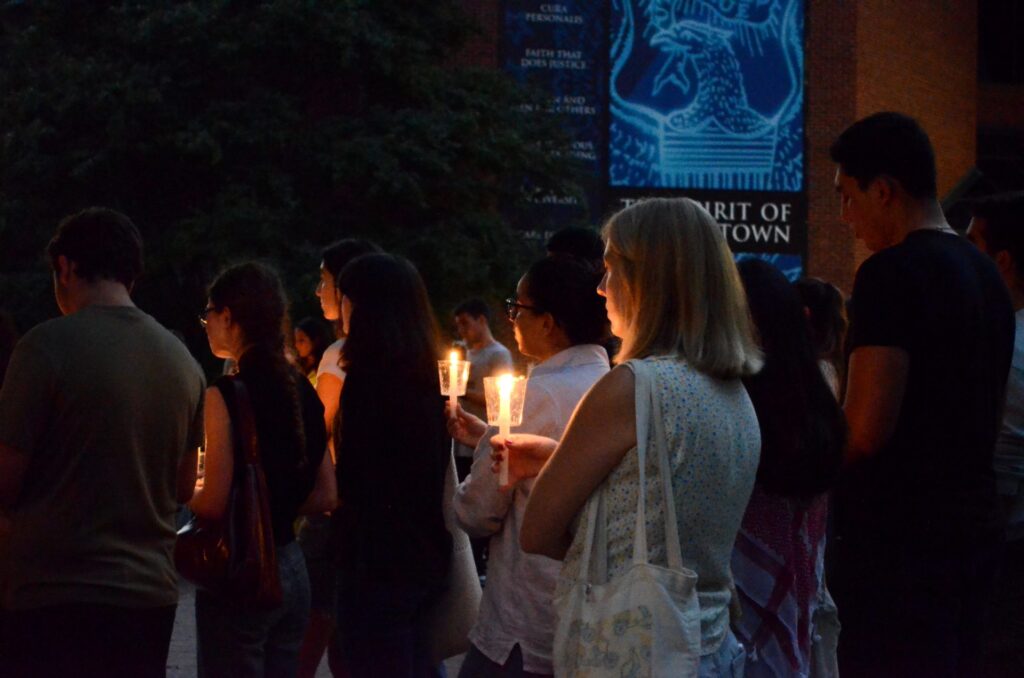
“I see the calls for blood donations at home, and I’m angry at the excess that runs through my veins because I want it to run through theirs,” Abu-Fadel said.
Moawad echoed this guilt, grief, and frustration in her own speech, saying that loss of civilian life shouldn’t be normalized just because Lebanon is in the Middle East.
“The voice of a whole nation suffering a war it did not choose has been silenced,” Moawad said. “When you read ‘Israeli-Hezbollah conflict’ in the media, please understand the magnitude and scale of the reality on the ground. And do not be desensitized to the living nightmare my people are going through every minute.”
Moawad and others called for a ceasefire in the region and emphasized how—in her eyes—international law has deeply failed the Lebanese people.
“We need a ceasefire now. Do not pity my Lebanon. Pity the ignorance of those complicit to the silence,” Moawad said. “Don’t you worry because this country will be rebuilt and rise again like it always has.”
Following Moawad’s speech, Nabil (MS ’25) and Ryan Abdallah (MSB ’25), two brothers from Lebanon, spoke. They, like Moawad, expressed grief at the normalization of violence in Lebanon.
“I think it’s really stupid how we always have to say Lebanese people are very resilient,” Ryan said. “This shouldn’t be the case. The fact that I have to hear stories about my grandmother getting kidnapped. I have to hear stories about my mom living through the war. My dad living through the war. It’s a joke. This shouldn’t be a normal thing for a child to live through.”
Their parents currently live 30 minutes from Beirut, which means while they can see the bombing, their parents haven’t been directly impacted by it, but the Abdallah brothers still worry about them.
“Right now they’re in Lebanon. I mean, they’re relatively safe, for the term relatively safe,” Nabil told the Voice. “We can see the smoke from the explosions. But we can’t hear them. That’s how it is. That’s how you describe safe?”
Ryan described his parents as very loving and patriotic and told the Voice they raised him and his brother to value community, unity, and love—as an antidote to the sectarian divisions that Lebanon has faced for years.
Both the brothers expressed how much they love Lebanon and its people.
“It’s a love for life, which makes the Lebanese people amazing. It makes it such a beautiful country to visit, such a beautiful country to call home,” Nabil told the Voice. “This devastation is the first time our generation has been through it. Our parents have seen it. God knows our grandparents have as well. Doesn’t make it normal.”
As the vigil came to a close, attendees blew out their candles and hugged each other before slowly trickling out of Red Square, but the grief will remain.
“I pray for a future generation who will never be reduced to collateral damage and will never know the normalization of violence and terror. I pray for my Lebanon,” Moawad said.
Editor’s Note: Romy Abu-Fadel is the Podcasts Executive Producer for the Voice.


